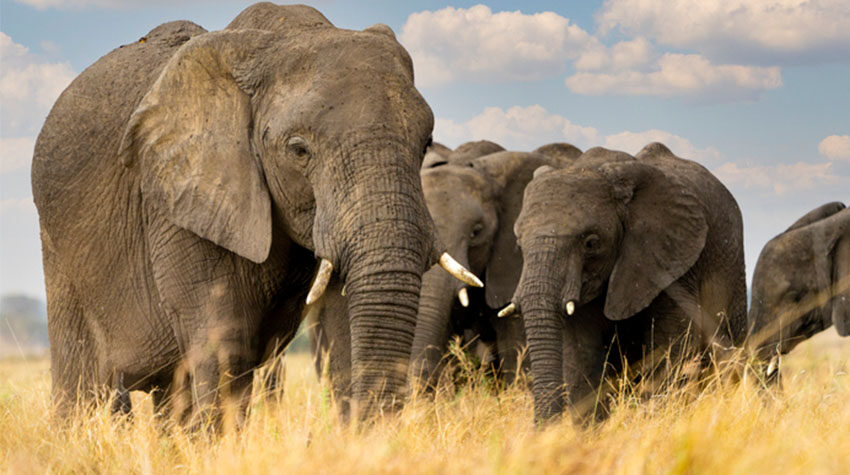
March 20, 2023Animal Law & Policy Clinic, BlogClinic, PAWS Push Feds to End African Elephant Capture, Trophy Hunting
A blog by Clinical Instructor Rachel Mathews about joint comments submitted today by Harvard Law School’s Animal Law & Policy Clinic and the Performing Animal Welfare Society in response to the U.S. Fish & Wildlife Service’s proposal to revise a special rule governing trade in African elephants under the Endangered Species Act.
Today, Harvard Law School’s Animal Law & Policy Clinic and the Performing Animal Welfare Society (PAWS)—which operates an accredited sanctuary providing refuge to elephants—jointly submitted comprehensive comments in response to the U.S. Fish & Wildlife Service’s (FWS) proposal to revise a special rule governing trade in African elephants under the Endangered Species Act (ESA).
African elephant populations are in sharp decline, and their continued existence is threatened by human-driven habitat destruction, hunting, capture, and climate change. Much attention is focused on poaching, but it is critical to acknowledge the United States’ own contributions to the loss of this species—American zoos capture elephants for display, and American hunters kill elephants to hang grisly trophies on their walls.
The FWS classifies African elephants as “threatened,” and has broad latitude to protect them. Its current regulations are meager: Zoos and circuses are free to sell African elephants in interstate commerce or import elephants without obtaining an ESA permit that would require them to show the activity would “enhance the propagation or survival of the species.” Hundreds of ESA-protected elephants have been imported to the United States over the last five decades, yet the FWS does not track what happens to them once they arrive, let alone assess whether facilities trading these animals provide acceptable living conditions.
For the first time, the FWS may require permits for interstate transfers of captive African elephants, and the agency would assess whether the recipient is “suitably equipped to house and care for” the animals. This would be a major step towards ensuring that African elephants are never again sold to a circus or roadside zoo.
Our comments urge the FWS to adopt elephant-specific standards to use in deciding whether to issue these permits and explain that licensure under the Animal Welfare Act (AWA)—a federal law that regulates businesses that use animals used in exhibition—is not sufficient. AWA standards do not ensure elephants have a high quality of life, and enforcement of the law is notoriously poor, even in cases of egregious animal welfare problems. The comments make clear that expansive habitats are vital for elephant welfare; family groups must be kept together; facilities must be attentive to male elephants’ unique physical and social needs; and public contact, rides, performances, and bullhooks must be prohibited.
We also urge the FWS to ensure that all commercial interstate transport of elephants is subject to the agency’s permit requirements. Under a longstanding and little-known interpretation of the ESA, the FWS does not deem profit-driven businesses like circuses and animal rental companies—which use animals to sell tickets, rides, and photo-ops—to be engaged in otherwise prohibited “commercial activity.” This runs contrary to the plain language and purposes of the ESA.
The proposed rule would also require countries exporting live elephants or hunting “trophies” to certify that elephant populations there are stable, and that funds derived from capturing or killing elephants will be put toward conservation. Countries exporting live animals would also be required to certify that they first consider placing elephants within their natural range, will keep elephant families intact “to the maximum extent practicable,” and will not export pregnant elephants. This represents an improvement to the existing rule but remains problematic.
Capturing elephants for captive display and killing them for sport are antithetical to the conservation of the species and legally indefensible under the ESA. We are particularly concerned by the “pay-to-play” system that the new rule would establish. Instead of assessing whether capturing or killing an elephant for importation enhances survival of the species (as required by the ESA), the FWS would assess whether some amount of money exchanged would be “applied primarily to African elephant conservation.”
Conservationalists, animal rights activists, members of congress, and courts have all criticized the FWS’s use of pay-to-play to avoid applying the ESA’s permitting requirements. In a decision by then-Judge Ketanji Brown-Jackson, which did not reach the merits because she found that the plaintiffs lacked standing, she nevertheless explained that the FWS’s pay-to-play approach “appears to thwart the dynamic of environmental protection that Congress plainly intended” when it established the ESA’s permitting requirements. New England Anti-Vivisection Soc’y v. FWS, 208 F. Supp. 3d 142, 176 (D.D.C. 2016).
Taken as a whole, our comments make a case against the importation of wild caught African elephants or their body parts. Elephants are highly intelligent and self-aware animals who live in extremely large and complex social networks, with related females forming relationships that last a lifetime. Their home ranges are environmentally dynamic and can measure hundreds, and even thousands, of square miles. We describe the enormity of elephants’ social, physical, and psychological needs; the grossly inhumane nature of captures; and the problems inherent to captivity including outcomes of previous imports.
In the end, the proposed regulations do not guarantee that elephants will be protected from unnecessary removal from the African continent or that families will not be separated during capture, with pregnant females left behind to fend for themselves at a time when they need their families most. Our incisive analysis of the proposed regulations and their effect on wild elephants presses for the greatest protection possible so African elephants can continue to live and thrive in their homelands.
The comments were authored by PAWS Director of Science, Research, and Advocacy Catherine Doyle, and Harvard Animal Law & Policy Clinic Clinical Instructor Rachel Mathews, Clinical Fellow Rebecca Garverman, and student Jeremiah Scanlan, JD ’24.
